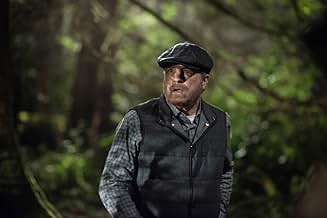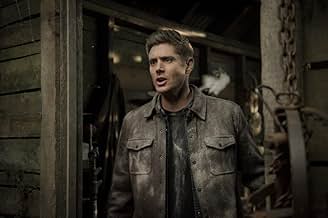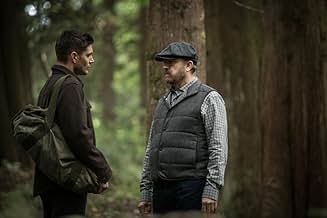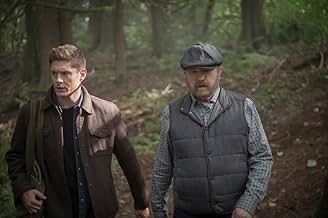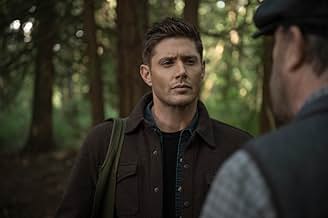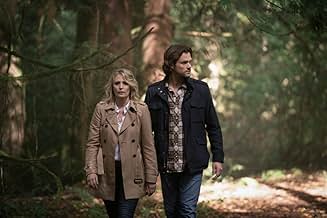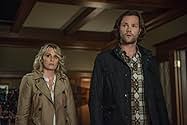Nightmare Logic
- Episode aired Nov 8, 2018
- TV-14
- 42m
IMDb RATING
7.7/10
2.7K
YOUR RATING
After a hunt gone wrong leaves Maggie's whereabouts unknown, Sam, Dean, Mary and Bobby race to find her, but what they find are their own worst nightmares.After a hunt gone wrong leaves Maggie's whereabouts unknown, Sam, Dean, Mary and Bobby race to find her, but what they find are their own worst nightmares.After a hunt gone wrong leaves Maggie's whereabouts unknown, Sam, Dean, Mary and Bobby race to find her, but what they find are their own worst nightmares.
- Director
- Writers
- All cast & crew
- Production, box office & more at IMDbPro
Featured reviews
I quite enjoyed the ep and Mystery. The whole monster thing is well good, we reached a stage where monsters weren't a threat at all especially after Dean came out of purgatory so the concept is sort of bringing newness.
The thing i didn't like was the Mary and Bobby drama, i just don't care. I think the Kripke, Gamble era was very bold, even though we joke about how much Sam and Dean die if you remove the goof deaths of Dean in mystery spot and Sam's in wishing well episode, the deaths meant something very big each time. Carver was ok with it too. It just feels like Dabb is trying this sticking to old characters thing too much. It's honestly taking away from what grounded the show. Bobby and Mary are not good additions. They would have been great for nostalgia for a one time thing but not this...Cas was the main problem of not letting a character go, then Crowley but fine it was understandable, they were basically leads too... This is too much. Let characters go.
Also seems to me that the thing had only one way of dying and it wasn't done... Strange.
Fan since episode 1. Mary has overstayed her welcome and fake Bobby isn't as good as real Bobby.
Michael changing monsters and the few episodes they did around that concept help make the show feel fresh again. The Jinn here for example keeps you guessing what the plot solution is which after 14 years of this show is hard to do. I also like that Bobby 2.0 is given a radically different backstory and demeanor from Bobby. I wish the show explored both of those concepts more.
As it is this episode feels like the start of something great that never really goes anywhere and it ends up being an unsatisfactory tease.
As it is this episode feels like the start of something great that never really goes anywhere and it ends up being an unsatisfactory tease.
I love that the brothers are back to fighting individual monsters!
"Nightmare Logic," the fifth episode of Supernatural's fourteenth season, directed by Darren Grant and written by Meredith Glynn, is a taut and engaging installment that expertly blends monster-of-the-week thrills with deeper explorations of character dynamics and the ongoing Michael crisis. The episode stands out for its inventive use of a familiar supernatural creature-the djinn-whose powers have been amplified by Michael's influence, creating a fresh and unsettling antagonist that ties directly into the season's larger mythology.
The episode opens with a chilling sequence following Maggie, the Apocalypse World hunter recently resurrected by Lucifer, as she investigates a dark mausoleum. The use of a first-person camera perspective during her attack by a monstrous figure immediately immerses viewers in a visceral horror experience, setting a tense tone that permeates the episode. This scene not only raises the stakes for Maggie's fate but also introduces the djinn's terrifying new ability to manifest victims' nightmares into reality, a concept that adds psychological depth and unpredictability to the threat.
Back at the bunker, Sam Winchester assumes a leadership role, managing and training the group of hunters from Apocalypse World. Jared Padalecki's portrayal of Sam as a responsible yet burdened leader is compelling, highlighting his growth and the weight of guiding others through a perilous world. The episode effectively contrasts Sam's leadership with Dean's more impulsive and emotionally fraught approach, especially as Dean confronts the djinn's handler, Neil. Jensen Ackles delivers a layered performance, balancing Dean's frustration, suspicion, and determination as he navigates the complex web of Michael's machinations.
The confrontation between Dean and Neil is a highlight, revealing Neil's enhanced djinn powers-mind reading, nightmare manipulation, and the ability to bring fears to life. The tension escalates as Neil attempts to probe Dean's nightmares, only to recoil in horror, suggesting a deeper mystery about Dean's psyche and his possession by Michael. This moment adds psychological complexity and foreshadows future revelations, effectively intertwining personal trauma with supernatural menace.
Director Darren Grant's pacing maintains a steady build of suspense, balancing action sequences with quieter, character-driven moments. The cinematography uses shadow and muted colors to enhance the episode's ominous atmosphere, while the editing ensures clarity amid the multiple narrative threads. The practical effects and creature design for the djinn's manifestations are effective, contributing to the episode's immersive horror.
Supporting performances, including Jim Beaver's Bobby and Samantha Smith's Mary, add emotional texture, particularly in scenes addressing the toll of hunting and the need for respite. The episode also explores themes of responsibility, trust, and the costs of leadership, as characters grapple with their roles in an increasingly dangerous world.
While "Nightmare Logic" was generally well-received, some critics noted that certain plot resolutions-such as Dean's quick defeat of the seemingly invincible djinn-felt convenient, potentially undermining the threat's established power. Additionally, the episode's multiple storylines occasionally risked fragmenting focus, though the strong performances and thematic cohesion largely mitigated these issues.
In conclusion, "Nightmare Logic" is a solid and suspenseful episode that advances Supernatural's fourteenth season by combining inventive monster lore with meaningful character development. Its blend of psychological horror, family dynamics, and mythological intrigue exemplifies the series' enduring appeal. The episode invites viewers to consider the nature of fear-both external and internal-and the resilience required to confront it. It stands as a testament to the show's ability to evolve while honoring its roots, delivering thrills and emotional depth in equal measure.
The episode opens with a chilling sequence following Maggie, the Apocalypse World hunter recently resurrected by Lucifer, as she investigates a dark mausoleum. The use of a first-person camera perspective during her attack by a monstrous figure immediately immerses viewers in a visceral horror experience, setting a tense tone that permeates the episode. This scene not only raises the stakes for Maggie's fate but also introduces the djinn's terrifying new ability to manifest victims' nightmares into reality, a concept that adds psychological depth and unpredictability to the threat.
Back at the bunker, Sam Winchester assumes a leadership role, managing and training the group of hunters from Apocalypse World. Jared Padalecki's portrayal of Sam as a responsible yet burdened leader is compelling, highlighting his growth and the weight of guiding others through a perilous world. The episode effectively contrasts Sam's leadership with Dean's more impulsive and emotionally fraught approach, especially as Dean confronts the djinn's handler, Neil. Jensen Ackles delivers a layered performance, balancing Dean's frustration, suspicion, and determination as he navigates the complex web of Michael's machinations.
The confrontation between Dean and Neil is a highlight, revealing Neil's enhanced djinn powers-mind reading, nightmare manipulation, and the ability to bring fears to life. The tension escalates as Neil attempts to probe Dean's nightmares, only to recoil in horror, suggesting a deeper mystery about Dean's psyche and his possession by Michael. This moment adds psychological complexity and foreshadows future revelations, effectively intertwining personal trauma with supernatural menace.
Director Darren Grant's pacing maintains a steady build of suspense, balancing action sequences with quieter, character-driven moments. The cinematography uses shadow and muted colors to enhance the episode's ominous atmosphere, while the editing ensures clarity amid the multiple narrative threads. The practical effects and creature design for the djinn's manifestations are effective, contributing to the episode's immersive horror.
Supporting performances, including Jim Beaver's Bobby and Samantha Smith's Mary, add emotional texture, particularly in scenes addressing the toll of hunting and the need for respite. The episode also explores themes of responsibility, trust, and the costs of leadership, as characters grapple with their roles in an increasingly dangerous world.
While "Nightmare Logic" was generally well-received, some critics noted that certain plot resolutions-such as Dean's quick defeat of the seemingly invincible djinn-felt convenient, potentially undermining the threat's established power. Additionally, the episode's multiple storylines occasionally risked fragmenting focus, though the strong performances and thematic cohesion largely mitigated these issues.
In conclusion, "Nightmare Logic" is a solid and suspenseful episode that advances Supernatural's fourteenth season by combining inventive monster lore with meaningful character development. Its blend of psychological horror, family dynamics, and mythological intrigue exemplifies the series' enduring appeal. The episode invites viewers to consider the nature of fear-both external and internal-and the resilience required to confront it. It stands as a testament to the show's ability to evolve while honoring its roots, delivering thrills and emotional depth in equal measure.
Did you know
- TriviaEmerging from the Rawling's crypt, Sam and Dean introduce themselves to the groundskeeper as Mr. Harrison and Mr. Byrne. This is a reference to Talking Heads members Jerry Harrison and David Byrne.
Details
Contribute to this page
Suggest an edit or add missing content

